|
|
|
Sort Order |
|
|
|
Items / Page
|
|
|
|
|
|
|
| Srl | Item |
| 1 |
ID:
148987
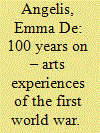

|
|
|
|
|
| Summary/Abstract |
On 1 July 2016, commuters and shoppers around the UK were pulled out of their daily routines when silent soldiers in First World War uniforms suddenly appeared among them, waiting on benches, walking single file in supermarket aisles and sitting opposite them in train carriages. The soldiers made eye contact with members of the public, and handed over cards with the name, rank, regiment and age of the soldier they represented who had lost his life on1 July 2016, the first day of the Battle of the Somme. Devised by Turner Prize winning artist Jeremy Deller in collaboration with Rufus Norris, director of the National Theatre, ‘We’re Here Because We’re Here’ was part of the extensive First World War arts programme 14-18 NOW.
|
|
|
|
|
|
|
|
|
|
|
|
|
|
|
|
| 2 |
ID:
139144
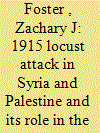

|
|
|
|
|
| Summary/Abstract |
The famine that befell Syria during the First World War was among the most tragic events in the region's modern history. The article argues that the 1915 locust attack, which is often neglected altogether or given terse treatment as one among a laundry list of causes of the famine, was a critical factor which drove many across the region, especially in Lebanon and Palestine, to starvation beginning in late 1915. Given that the scale of the attack was far worse than anything Syria had witnessed in many decades, if not centuries; and that a huge percentage of the region's major foodstuffs and sources of livelihood, including fruits, vegetables, legumes, fodder and a small but not insignificant amount of cereals, were devoured by the locusts, it is suggested that many of the 100,00–200,000 people that died from starvation or starvation-related diseases in the year immediately following the attack – that is, from November 1915 to November 1916 – can be attributed to the locust invasion.
|
|
|
|
|
|
|
|
|
|
|
|
|
|
|
|
| 3 |
ID:
114872
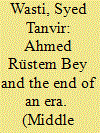

|
|
|
|
|
| Publication |
2012.
|
| Summary/Abstract |
Ahmed Rüstem Bey was accredited as Ottoman Ambassador to the United States of America at a critical juncture before the First World War. The Ottoman Empire had weakened as a result of revolts by many minorities agitating for self-determination and a series of military conflicts culminating in the Balkan Wars. Ahmed Rüstem Bey, though born in Turkey of non-Turkish parentage, was a dyed-in-the-wool Ottoman who felt deeply attached to his country. As Ambassador his stay in the US was short and controversial. Information on Ahmed Rüstem's life and career needs augmentation, and the present article represents an initial attempt to portray this unconventional diplomat.
|
|
|
|
|
|
|
|
|
|
|
|
|
|
|
|
| 4 |
ID:
130269
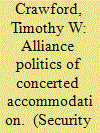

|
|
|
|
|
| Publication |
2014.
|
| Summary/Abstract |
This article examines the challenges allies face in coordinating diplomatic efforts to accommodate and peel off their main enemy's Potential Allies. It elucidates the key dimensions, and the underlying Coordination Dynamics, of this problem of "concerted accommodation," and it develops propositions about the conditions that shape the efficacy of such efforts. The argument links allies' strength to their divergent or convergent assessments of the target state's ability to tip the war toward victory or defeat. Divergent assessments foster weak allied efforts that are likely to fail, but when allies agree that the target is a potential "war-tipper," they will support their concerted accommodation policy with more robust cooperation that is more likely to work. The causal arguments and mechanisms are examined in a paired comparison analysis of two First World War cases: the Entente's efforts to induce (1) Ottoman neutrality and (2) Italian intervention.
|
|
|
|
|
|
|
|
|
|
|
|
|
|
|
|
| 5 |
ID:
080575
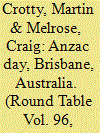

|
|
|
|
|
| Publication |
2007.
|
| Summary/Abstract |
This article proceeds through a case study of commemorative rhetoric in a British settler state, Australia, and in a provincial capital, Brisbane, whose dominant commemorative group, the Anzac Day Commemoration Committee (ADCC), had claims to have invented the national memorial rituals for the principal day of remembrance. It briefly surveys the broader Australian commemorative background, then explores the control of Anzac Day in Brisbane, focusing on accommodations and alliances between political, civil and religious leaders and the principal returned soldiers' organization, the Returned Sailors' and Soldiers' Imperial League of Australia (RSSILA) on the ADCC, in Anzac Day activities, and in Anzac Day rhetoric. The article suggests that the theme of 'triumphalism' has been underplayed in analysis of interwar commemorative rhetoric in Australia, and that cooperation, accommodation and alliance were more typical of interwar commemoration than contest
|
|
|
|
|
|
|
|
|
|
|
|
|
|
|
|
| 6 |
ID:
101065
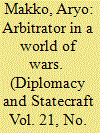

|
|
|
|
|
| Publication |
2010.
|
| Summary/Abstract |
The League of Nations is primarily remembered for its failures in the 1930s. Indeed, the established perception of its history usually emphasizes weaknesses. Failing to settle the question of which Power should possess the former Ottoman province of Mosul after the First World War, Turkey saw the dispute addressed to the League in summer 1924. Within a short time, a multi-leveled negotiation process that involved a large number of politicians, diplomats, and lawyers was put in motion. Sixteen months and many crises later, the League Council awarded the entire Mosul province to Iraq. The arbitration had been based upon data collected by two enquiry commissions comprising representatives from eight different Powers, the work of both numerous mediators, and a Council sub-committee. Though certainly not perfect, the League's role averted war and renewed disaster.
|
|
|
|
|
|
|
|
|
|
|
|
|
|
|
|
| 7 |
ID:
122336
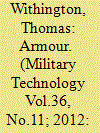

|
|
|
|
|
| Publication |
2012.
|
| Summary/Abstract |
The idea of using strong materials to protect military personnel and assets is as old as the hills. Soldiers have been using body armour for thousands of years. Armour has been applied for vehicle since the earliest combustion engine - driven platforms appeared on the battlefield. Similarly, ships began to use armour in the 15th Century ant eh necessity of outfitting aircraft with armour protection became evident in the First World War.
|
|
|
|
|
|
|
|
|
|
|
|
|
|
|
|
| 8 |
ID:
140958
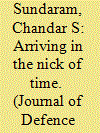

|
|
|
|
|
| Summary/Abstract |
Today, military historians as well as those dealing with colonial South Asian history tend to overlook the fact that during the First World War, the Indian Army was Britain’s strategic reserve. It vitally despatched over 150,000 troops to the Western Front to shore-up the British sector in the critical period of 1914-1915. To the Indian sepoys who crossed the kala pani to fight, die or be wounded in the trenches there, it was a jarring initiation into modern industrialised warfare. This article examines that episode and advances two arguments: first, that, contrary to accounts written as recently as the 1980s, Indian sepoys performed quite well in the trenches; second, that racial concerns and the advent of the Kitchener armies, rather than a poor combat record, led to their transfer from the Western Front at the end of 1915.
|
|
|
|
|
|
|
|
|
|
|
|
|
|
|
|
| 9 |
ID:
169231
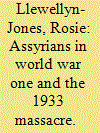

|
|
|
|
|
| Summary/Abstract |
The recent discovery of a bundle of documents in the archives of the Royal Society for Asian Affairs has shed more light on the history of the Assyrian Christians of Iraq from the time of the First World War up to the Simele massacre in 1933. The documents are accounts and correspondence written primarily by a number of leading British players including Major-General Dunsterville, Sir Henry Dobbs, Colonel J.J. McCarthy, and also the Assyrian Patriarch Mar Shimun. They also shed further light on the role played by Leo Amery, Secretary of State for the Colonies. The documents appear to have been compiled by Sir Percy Sykes, the then Secretary of the Royal Central Asian Society (as the Royal Society for Asian Affairs then was) as part of an investigation into the situation of the Assyrians. This article introduces the newly-discovered collection of documents and discusses how they advance our understanding of this period.
|
|
|
|
|
|
|
|
|
|
|
|
|
|
|
|
| 10 |
ID:
181102
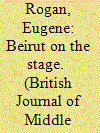

|
|
|
|
|
| Summary/Abstract |
In the immediate aftermath of the First World War, two nationalist theatre companies in Beirut staged a new play in 1919 encapsulating the civilian hardships of four years of the war. While little is known of the author, George Murad, details from the preface and dedication to the printed edition would situate him among pro-French Maronite Christians seeking independence for a greater Lebanon under French protection. The play, “Beirut on the Stage,” would appear to have been an example of political theatre seeking to validate the wartime suffering of Lebanese Christians through a vision of independence that, by the time the play was published in 1920, had already been undermined by French measures to colonise, rather the liberate, Greater Lebanon.
|
|
|
|
|
|
|
|
|
|
|
|
|
|
|
|
| 11 |
ID:
161359
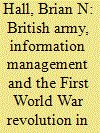

|
|
|
|
|
| Summary/Abstract |
Information Management (IM) – the systematic ordering, processing and channelling of information within organisations – forms a critical component of modern military command and control systems. As a subject of scholarly enquiry, however, the history of military IM has been relatively poorly served. Employing new and under-utilised archival sources, this article takes the British Expeditionary Force (BEF) of the First World War as its case study and assesses the extent to which its IM system contributed to the emergence of the modern battlefield in 1918. It argues that the demands of fighting a modern war resulted in a general, but not universal, improvement in the BEF’s IM techniques, which in turn laid the groundwork, albeit in embryonic form, for the IM systems of modern armies.
|
|
|
|
|
|
|
|
|
|
|
|
|
|
|
|
| 12 |
ID:
079234
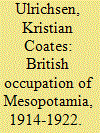

|
|
|
|
|
| Publication |
2007.
|
| Summary/Abstract |
During World War I the military campaign in Mesopotamia placed enormous demands on local man- and animal power to provide the logistical resources vital to its conduct. This required the British civil and military authorities to construct a wartime state apparatus that filled the administrative vacuum left by the retreating Ottomans and made possible its downward penetration and mobilisation of local resources for the war effort. This article examines the interaction of politics and logistics in Mesopotamia and views the enhanced wartime levels of resource extraction in light of the British attempts to codify their presence in the country after 1918 and the nationalist backlash that resulted.
|
|
|
|
|
|
|
|
|
|
|
|
|
|
|
|
| 13 |
ID:
027371
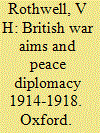

|
|
|
|
|
| Publication |
Oxford, Clarendon Press, 1971.
|
| Description |
viii, 315p.Hbk
|
|
|
|
|
|
|
|
|
|
|
|
Copies: C:1/I:0,R:0,Q:0
Circulation
| Accession# | Call# | Current Location | Status | Policy | Location |
| 008800 | 940.32041/ROT 008800 | Main | On Shelf | General | |
|
|
|
|
| 14 |
ID:
089299
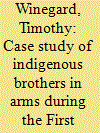

|
|
|
| 15 |
ID:
148021


|
|
|
|
|
| Summary/Abstract |
In the imaginations of many, war in British India had its focus on the North-West Frontier and was fought against the tribes of that region. However, British thinking about Indian defence involving Afghanistan underwent tremendous change over the period under consideration. British plans to meet a Russian invasion on the Kabul-Kandahar Line in 1904 resembled those of any other Nineteenth Century Imperial campaign, with numbers of infantry and cavalry still being thought of and referred to as bayonets and sabres. Twenty years later, heavily influenced by the experiences of the Great War in the region and the Third Afghan War and associated operations, the calculus was different with logistics changed by motor vehicles and the introduction of what today are referred to as force multipliers, such as aeroplanes and machine guns. It was over this period that warfare as fought and conceptualised by men like Napoleon gave way to modern practices familiar to us today.
|
|
|
|
|
|
|
|
|
|
|
|
|
|
|
|
| 16 |
ID:
098459
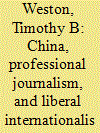

|
|
|
|
|
| Publication |
2010.
|
| Summary/Abstract |
This article shows that Chinese sensitivity about the way the Western press covers China, a point of obvious relevance today, has a lengthy and rich history. The article focuses on the movement to professionalize Chinese journalism in the late 1910s and early 1920s and on ways in which that movement was bound up in a transnational conversation about journalism reform, as well as in educational institution-building efforts, that flowed from the United States to East Asia. Concentrating on linkages between China, the United States and Japan, the article argues that the effort to transfer American journalistic norms to China was undercut both by the Western-dominated political and economic forces that shaped the flow of information in the world at the time, and by the failure of Western journalism to live up to its own standards insofar as its coverage of China was concerned. Given the rising nationalism in China at that time, such problems proved very consequential. These conclusions are based on an analysis in the last section of the article of Chinese participation in the Press Congress of the World meeting convened in Honolulu, Hawai'i, in 1921. The Chinese who attended that meeting were among the most Westernized and self-consciously professional journalists in China and, as such, were in a unique position to critique Western journalism practice in China on its own terms.
|
|
|
|
|
|
|
|
|
|
|
|
|
|
|
|
| 17 |
ID:
191799
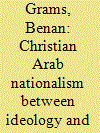

|
|
|
|
|
| Summary/Abstract |
Whether for his political choices or his philanthropic activities, Gregorios IV Haddad, the Patriarch of Antioch and the Whole East 1906–1924, is still remembered as a strong supporter of Arabism. Arab nationalist historiography overwhelmingly locates Gregorios’s story within the ideological framework of Arabism nationalism. This ideological interpretation, however, simplifies the intricate political reality in the final decade of Ottoman rule in Syria, a period characterized by a multiplicity of identities including Ottomanism, Arabism and Islamism. More importantly, it downplays Gregorios’s political brilliance and pragmatic approach in running the affairs of the Greater Syrian Christians, a minority community that was subject to suspicion and censorship during critical historical junctures. This article examines some of the ways in which a leader of a religious minority navigated the political upheavals that characterized the Ottoman Empire’s last decade of power in Greater Syria. It will show that Gregorois’s sense of responsibility for his community obliged him to prioritize pragmatism over nationalist ideology in order to best respond to the political circumstances of the time.
|
|
|
|
|
|
|
|
|
|
|
|
|
|
|
|
| 18 |
ID:
103786
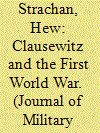

|
|
|
| 19 |
ID:
146836
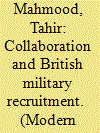

|
|
|
|
|
| Summary/Abstract |
This article examines the ways in which rural elite collaborators mobilized recruits for the British Army during the First World War. It thus not only increases knowledge of Punjab's military history, but adds to the understanding of collaboration as a process involving competitive groups in which elites manipulated the process for their own ends. The case study material drawn from the Shahpur district of the colonial Punjab argues that while there may have been a degree of indoctrination into the colonial state's values, it was mainly the desire to use its patronage to bolster family influence or to transform local hierarchies that was the key factor in securing willing collaborators. The competition for local power and influence provided a local dynamic to the collaborative process. The state could of course take advantage of this competition to serve its interests, just as the Punjabi tribal chiefs could utilize state patronage to beat off rivals to their power. Collaboration was thus a dynamic two-way process, rather than, as it is often portrayed, a top-down, one-way relationship.
|
|
|
|
|
|
|
|
|
|
|
|
|
|
|
|
| 20 |
ID:
101063
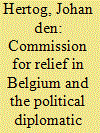

|
|
|
|
|
| Publication |
2010.
|
| Summary/Abstract |
During the First World War, the Commission for Relief in Belgium (CRB) supplied occupied Belgium with food, provoking discord between military and political leaders on both sides. The CRB's work undermined the Allies' economic blockade of the enemy, attracting military criticism. In Germany, politicians favoured sustaining the food supply to prevent unrest, whilst the Army wanted to exploit Belgium's resources. From 1916 onwards, the CRB became a bone of contention in Germany in the dispute between military and political leaders about unrestricted submarine warfare. It also loomed large in the political and military debate about the attitude to neutral countries: the Allies wanted them to brave the German threat and cooperate with the blockade policy-otherwise, food imports from Allied countries would be forbidden. Tonnage and food for the CRB were incorporated into the negotiations with neutral countries about their imports and the use of home-grown produce. The debates about the CRB thus exemplify the relationship between military events and the war's economic and social significance. This study of the CRB shows that political/diplomatic historiography can bridge the gap between the military and socioeconomic history of the First World War.
View Full Text Article
|
|
|
|
|
|
|
|
|
|
|
|
|
|
|
|
|
|
|
|
|